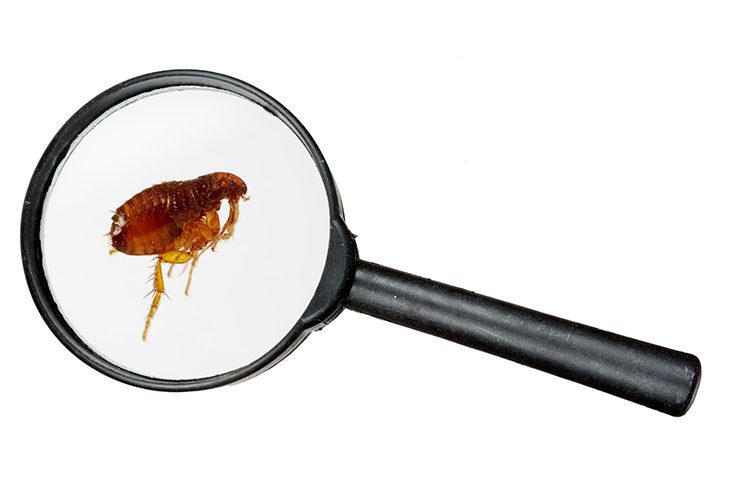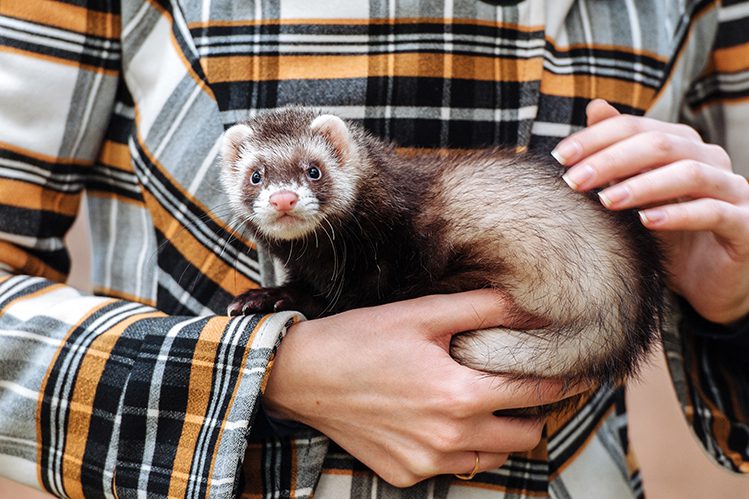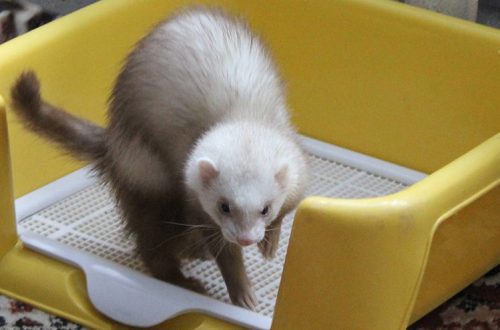
Fleas in a ferret: what to do?
Can a pet ferret get fleas? What are the symptoms of a parasite infestation? Are fleas dangerous to humans? How to treat a ferret so as not to harm his health? About this in our article.
Contents
Can a pet ferret get fleas?
Fleas can start up even in those pets who have never walked on the street and have not been in contact with other animals: cats, dogs, ferrets, rabbits … Why is this happening?
Fleas live in the basements of residential buildings and can enter the apartment directly from the entrance, for example, into the gap under the door. Secondly, you can accidentally bring adult parasites (or their eggs) into the house yourself: on your shoes and clothes. If you have a dog or cat that walks on the street, then the risk of fleas in the house increases significantly.
Another way of infection is through grass, uncleaned filler and various attributes for a ferret: a hammock, a bed, textile toys. If you take things “from hand” from someone, then first of all they need to be processed: thoroughly washed and disinfected. And then give the ferret.
Now you know that even the most pet ferret in the world can get fleas. These parasites multiply very quickly and cause a lot of trouble. But if you recognize the problem in the early stages, getting rid of fleas is not difficult.
Fleas bite not only pets, but also their owners. Flea bites can cause scratching and allergies.

How can you tell if a ferret has fleas?
As long as the ferret has few fleas, you may not notice adult parasites. But other signs will give them away:
- Itching. Have you noticed that the pet began to itch and bite into its own fur, as if trying to catch someone with its teeth? This is the first symptom indicating fleas. Carefully inspect the skin and coat of the ferret.
- Black spots on the skin. It is nothing but flea excrement.
- Bites, scratches, bald patches. Fleas bite and bites itch. In an attempt to scratch the bite and catch the parasite, ferrets often scratch their skin and tear out their fur. You may notice bites, sores, sores, and bald patches. These symptoms can also speak of other dermatological diseases, but in combination with the first two signs, they definitely signal fleas.
- Changes in behavior. Fleas can make a ferret irritable and restless. Sometimes pets refuse to eat.
- adult parasites. You can see them on the body of a ferret or, for example, on its couch. The spectacle is not pleasant, but there will be no doubt!
With a large number of fleas, a ferret can develop flea dermatitis and anemia, as fleas suck out a lot of blood. Anemia is especially dangerous for babies and medium-sized weakened ferrets.
Due to the sores on the skin, a secondary infection may develop. The more fleas, the more difficult it is to get them out. Fleas lay their eggs in the folds of upholstered furniture, in carpets, things, on beds. To get rid of them, you have to process the entire apartment.

How to remove fleas from a ferret?
Say thanks to the modern pet industry. To combat fleas, many effective, safe and convenient means have been invented: drops, shampoos, collars, sprays. The only thing is that there are no specialized products for ferrets. These pets are suitable for dogs and cats.
To choose the right remedy, it is better to consult a veterinarian. He will examine the ferret, weigh it and recommend a good drug in the dosage that will work and be safe for the pet.
Please note that flea shampoos and collars are more prevention methods than parasite control. If the ferret already has fleas, it is better to use special drops on the withers. This is the most efficient way. Before processing, carefully read the instructions for use. Usually, any bath procedures are prohibited 2-3 days before applying the drops and for the same number of days after. Otherwise, they won’t work.
Your task is to process not only the ferret, but also all other pets in the house, as well as household items. Furniture, carpets and beds need to be treated with a special flea spray. Follow the instructions for use, be careful not to overdo it.
Fleas do not live on the animal itself, but indoors: on a pet bed, upholstered furniture, in crevices, behind a baseboard. To get rid of them, you will have to process the entire apartment.
Carefully monitor the condition of the ferret after applying the drug. Your pet may have an allergic reaction. Contact your veterinarian to understand how to proceed.
Removing fleas is not the most pleasant experience. Therefore, infection is best avoided. The ferret needs to be treated for parasites throughout its life: 1 time per quarter. Even if the ferret does not walk on the street and does not come into contact with other animals.
After treatment for fleas, the ferret will need to be treated for helminths. Usually if the pet has fleas, then there are worms.
Every owner wants his pet to be healthy and happy. To a large extent, it depends on us. Be careful, do not neglect prevention and do not start ailments.
We are very proud of caring owners like you! May your ferrets be healthy.





